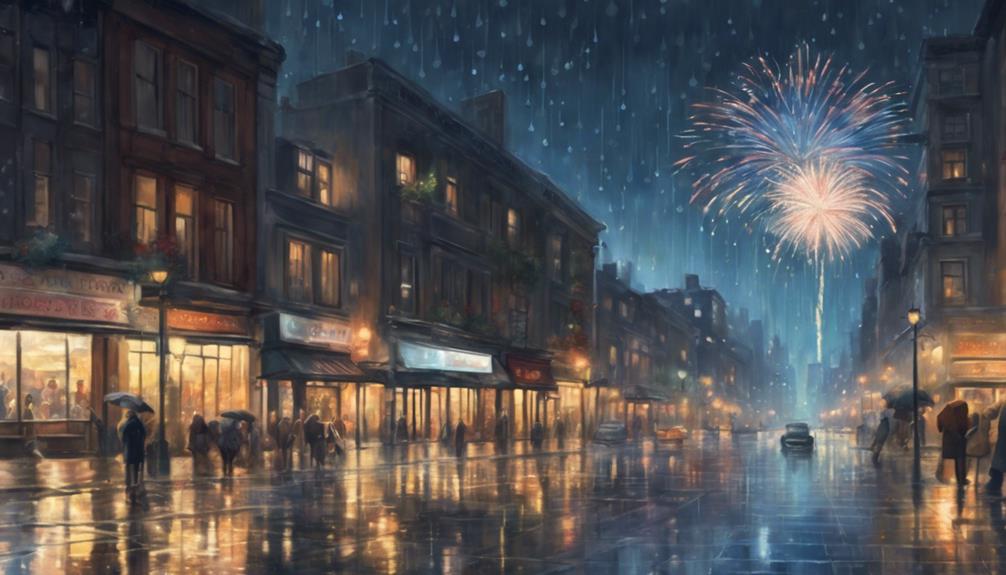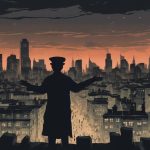As you immerse yourself in the melancholic atmosphere of "Rain on New Year's Eve," the poet's vivid imagery transports you to a deserted cityscape, where the eerie silence and towering skyscrapers amplify the sense of loneliness. The rain becomes a symbol of cathartic release, whispering secrets of love, loss, and memories. You'll find yourself confronting the fleeting nature of time, where resolutions are shattered, and the promise of renewal feels hollow. And yet, in this somber atmosphere, you'll discover a nuanced exploration of human experience, where the monotony of urban life is exposed. And as you venture deeper, the true depth of this poignant poem awaits.
Somber Atmosphere of Rainy Nights
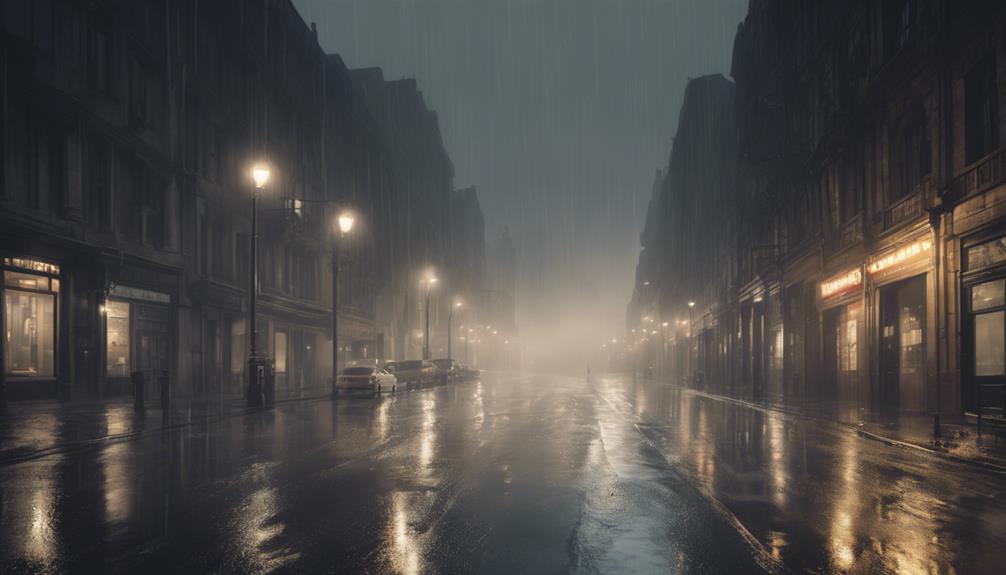
As you explore the poem, the somber atmosphere of rainy nights envelops you, evoking a sense of melancholy that permeates every line. The poet's masterful use of language transports you to a world where the darkness is calming, a respite from the chaos of urban life. The rainy nights become a symbol of urban isolation, where the city's bustling streets are replaced by empty, rain-soaked sidewalks.
In this eerie calm, the poet weaves a tapestry of emotions, expertly capturing the mood of a solitary figure lost in thought. The rainy nights serve as a backdrop, heightening the sense of loneliness, yet simultaneously offering a strange sense of comfort. The darkness is calming, not oppressive, a balm to the narrator's soul. As you explore further into the poem, you begin to appreciate the poet's nuanced exploration of the human experience, where urban isolation is not just a physical state, but an emotional one as well.
Imagery of Cityscapes and Loneliness
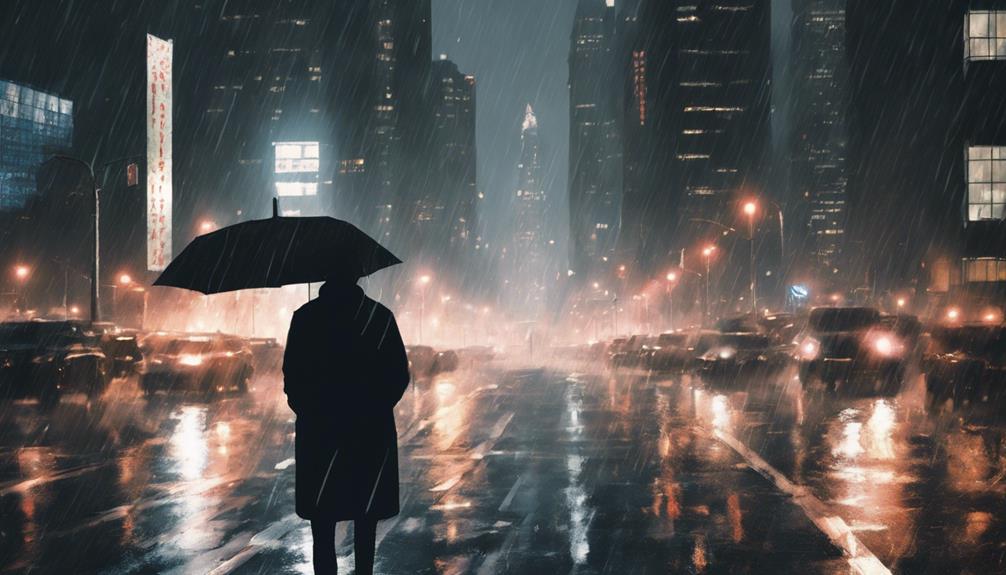
The poet's vivid depiction of cityscapes, replete with deserted streets and towering skyscrapers, serves as a poignant backdrop for the narrator's introspective journey, allowing you to inhabit the desolate landscape of their loneliness. As you wander through the urban landscapes, you're struck by the eerie silence that permeates the metropolitan streets. The towering skyscrapers, once symbols of progress and innovation, now loom as monolithic sentinels, casting long shadows that seem to swallow the narrator whole. The city, once a hub of activity, is now a desolate expanse, devoid of human connection. You can't help but feel the weight of metropolitan isolation, as the narrator's loneliness is amplified by the city's cold, unforgiving architecture. The poet's masterful use of imagery invites you to step into this desolate world, where the only sound is the echoes of the narrator's solitary heartbeat.
Disillusionment in the New Year
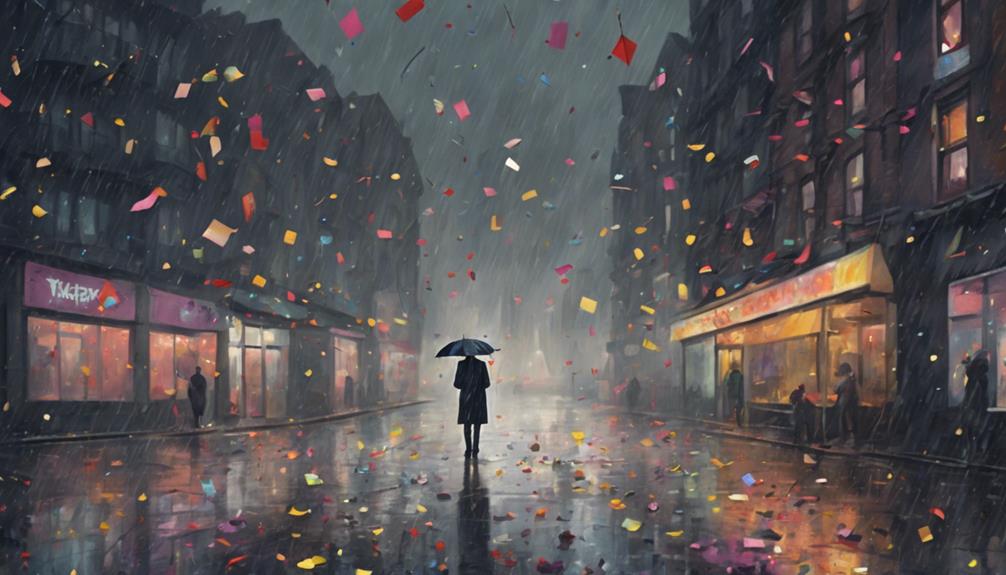
You stand at the threshold of a new year, yet the promise of renewal and rebirth rings hollow, as the familiar rituals of celebration seem to mock your own sense of disillusionment. The fireworks that once lit up the night sky with excitement now seem like a distant memory, a fleeting moment of joy in an otherwise bleak landscape. As you gaze out at the rain-soaked streets, you can't help but feel a sense of fading optimism, a realization that the hopes and dreams you harbored just a year ago have failed to materialize.
The resolutions you made with such fervor have been shattered, left in pieces like the confetti that litters the sidewalk. You're left to confront the harsh reality that, despite the passage of time, little has changed. The promises of a brighter tomorrow remain unfulfilled, leaving you with a sense of disillusionment that's hard to shake. As the clock strikes midnight, you can't help but wonder if the coming year will bring more of the same – a cycle of disappointment and unfulfilled promises.
The Fleeting Nature of Time
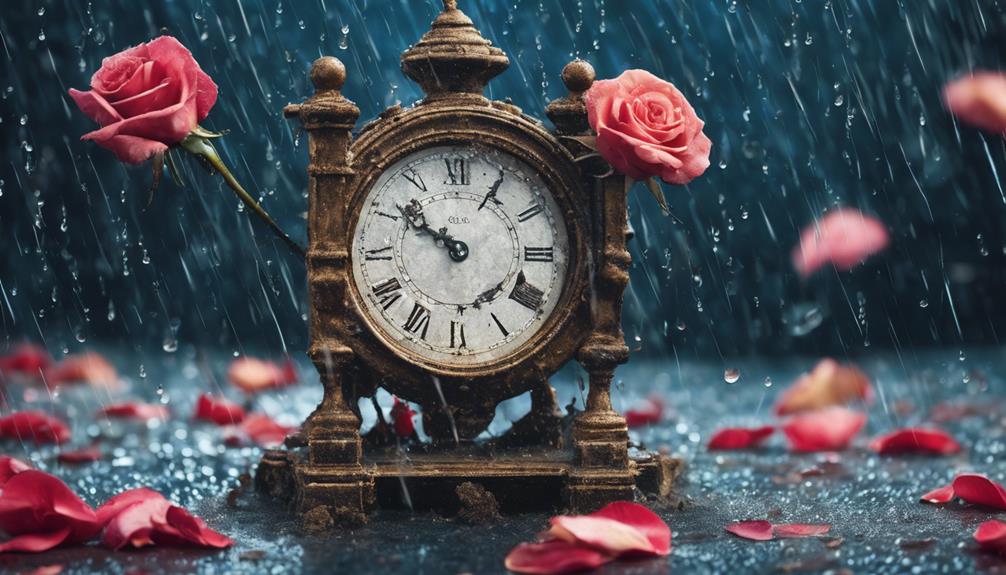
Time, once a boundless expanse of possibility, now seems to slip through your fingers like sand in an hourglass, each grain a reminder that the New Year's promises of renewal are fleeting, leaving you to confront the harsh reality of unfulfilled dreams. As you stand at the threshold of a new year, you're forced to confront the ephemeral nature of moments, the brevity of which underscores the temporal fragility of human existence. The clock ticks on, merciless and unyielding, a constant reminder that time waits for no one. You're left to ponder the what-ifs and the maybes, the roads not taken, and the opportunities lost. The fleeting nature of time is a harsh mistress, cruel in her indifference, and unforgiving in her relentless march forward. And yet, it's in this fragile, ephemeral existence that you're forced to find meaning, to cling to the moments that make life worth living, and to cherish the fleeting beauty of the present.
Symbolism of Rain and Melancholy
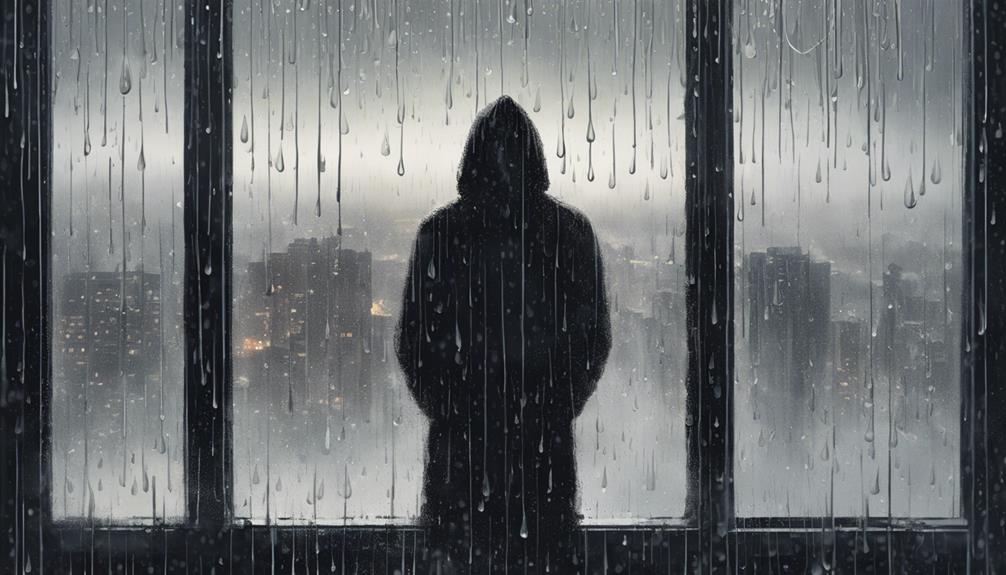
Melancholy's misty veil shrouds your reflection, as raindrops patter against the windowpane, a somber serenade echoing the sorrow that permeates your heart. The rhythmic beat of the raindrops on the roof above mirrors the cadence of your heartbeat, a nostalgic echo of memories past. Rainy nostalgia washes over you, a melancholic revival of moments lost in the annals of time. As you gaze out into the rain-soaked night, the droplets on the windowpane blur the distinction between past and present, and the veil of melancholy thickens.
The rain, an aural embodiment of your sorrow, whispers secrets of what could've been, of love and loss, of memories now tinged with a hint of sadness. It's as if the rain is washing away the façade, revealing the underlying currents of your emotions. In this somber atmosphere, time stands still, and the rain becomes a cathartic release, a melancholic revival of the heart. As the rain slows to a gentle patter, the melancholy begins to lift, leaving behind a sense of cleansing, a renewal of the heart.
The City's Emptiness and Silence
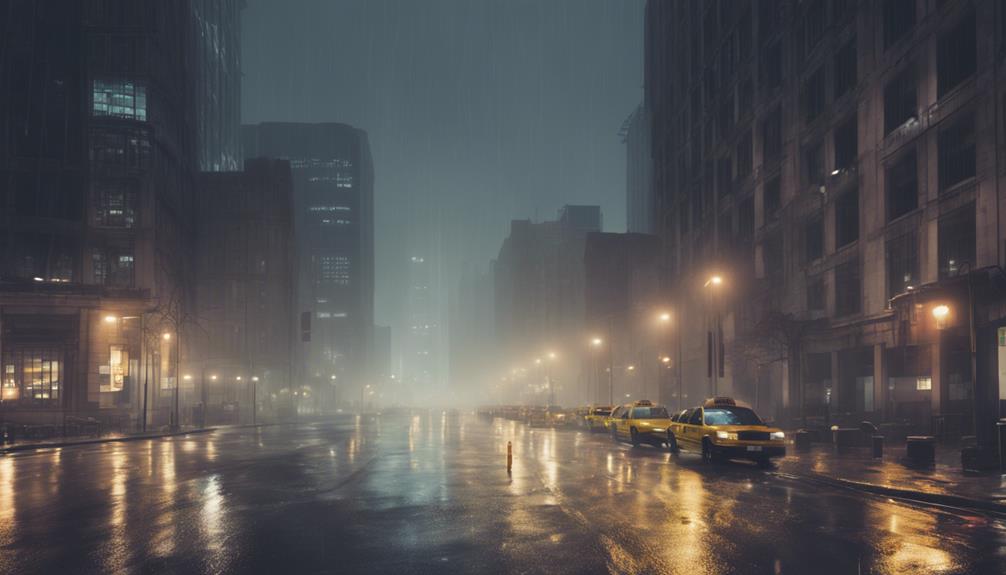
As the rain's melancholic serenade fades into the stillness of the night, the city's deserted streets, once a hub of revelry, now stand as a proof to the silence that has swallowed the din of celebration. You're left to navigate the desolate landscape, where the only sound is the echo of your own footsteps. The city, once a thriving metropolis, now feels like a hollow shell, devoid of life and energy. This sense of urban alienation is palpable, as if the city itself is a monument to loneliness.
The deserted landscapes stretch out before you, a seemingly endless expanse of emptiness. The neon lights that once illuminated the night sky now cast an eerie glow, a reminder of the revelry that has long since passed. You can't help but feel like a ghost haunting the streets, searching for a connection that never materializes. The city's silence is oppressive, weighing heavily on your shoulders as you wander through the deserted streets, searching for a sense of belonging in a place that seems to have forgotten you.
The Speaker's Introspective Journey
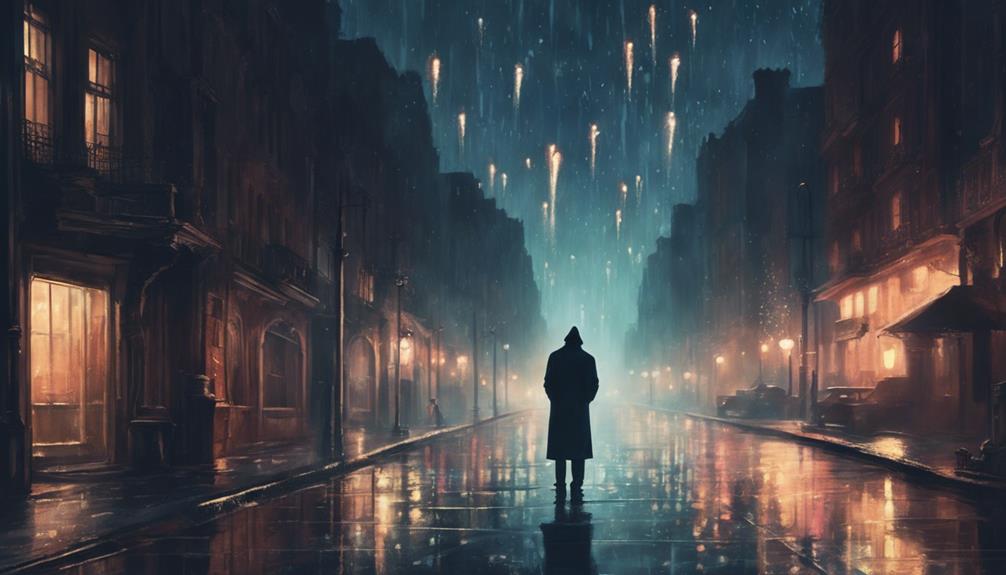
Wandering through the desolate streets, you're enveloped in a profound sense of introspection, where the city's silence serves as a catalyst for self-reflection, prompting you to explore the fragments of your own identity. As you venture deeper into the labyrinth of your mind, the echoes of past experiences resurface, and the weight of unfulfilled desires becomes palpable. This introspective journey sparks a tumultuous inner struggle, as the dichotomy between your aspirations and reality intensifies. Amidst this turmoil, you're compelled to address the voids within, and the fragility of your own existence. It's in this abyss of self-doubt that you're forced to confront the imperfections, the what-ifs, and the maybes. Yet, it's within this darkness that the seeds of personal growth are sown, and the possibility of transformation takes root. Will you emerge from this journey with a renewed sense of purpose, or will the shadows of your psyche consume you? The silence of the city serves as a constant reminder: the choice is yours.
Monotony of Urban Life Exposed
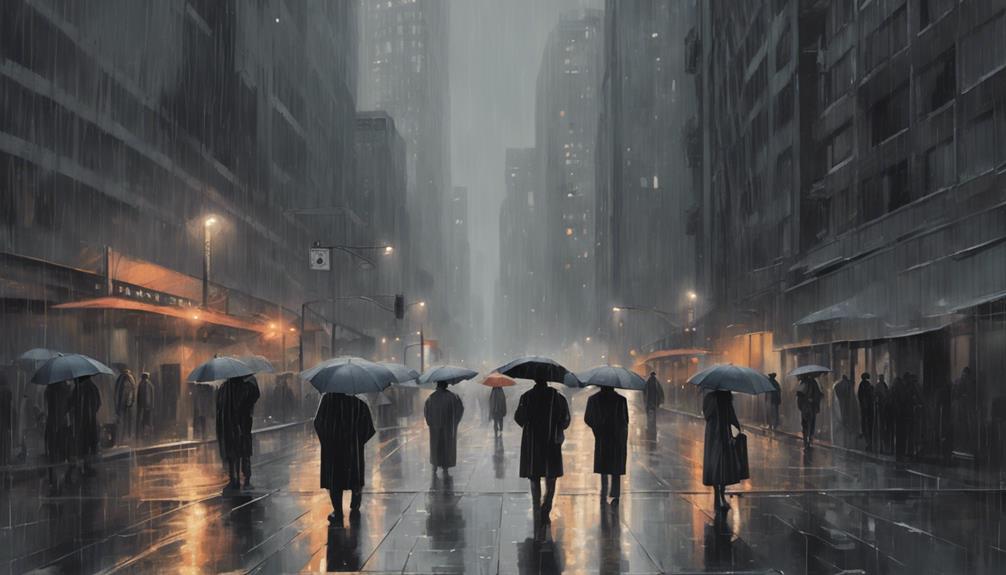
In the city's eerie stillness, you're struck by the monotony that underlies the urban façade, where the endless stream of days blends into a haze of routine, and the staccato rhythms of city life – the wail of sirens, the rumble of subways – become a numbing white noise that dulls the senses.
As you navigate the concrete jungle, you're confronted with the urban alienation that permeates every aspect of city living. The daily grind, with its relentless pace and frenetic energy, can be suffocating. The anonymity of urban life, where faces blend into a sea of strangers, can be isolating. You're just another face in the crowd, lost in the sea of humanity.
The monotony of urban life is further exacerbated by the repetitive nature of daily routines. The daily commute, the 9-to-5 grind, the endless cycle of work and sleep, all blend together in a haze of monotony. The city, with its bright lights and bustling streets, can be a lonely and isolating place, where the only comfort is the familiarity of the daily routine.
The Struggle to Find Meaning
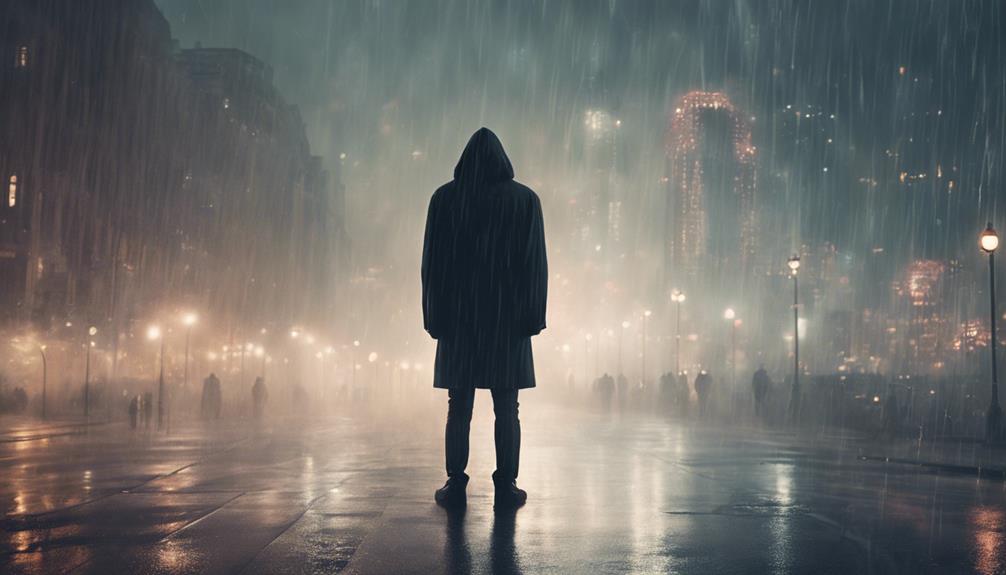
Amidst the city's din and distraction, you find yourself grappling with the existential question: what gives your life meaning? As the clock strikes midnight, and the confetti settles, you can't help but wonder if the monotony of urban life is all there is. The struggle to find meaning is a palpable one, as you navigate the complexities of modern existence. Existential dread creeps in, like a thief in the night, stealing your sense of purpose.
In this moral ambiguity, you're left to ponder the significance of your actions. Are they mere fleeting moments, lost in the void of time, or do they hold some deeper significance? The city's bright lights and bustling streets can't mask the quiet desperation that lurks within. You're forced to confront the uncertainty that lies at the heart of human existence. In this struggle to find meaning, you're left to craft your own narrative, to forge a sense of purpose amidst the chaos.
A Reflection of Human Experience
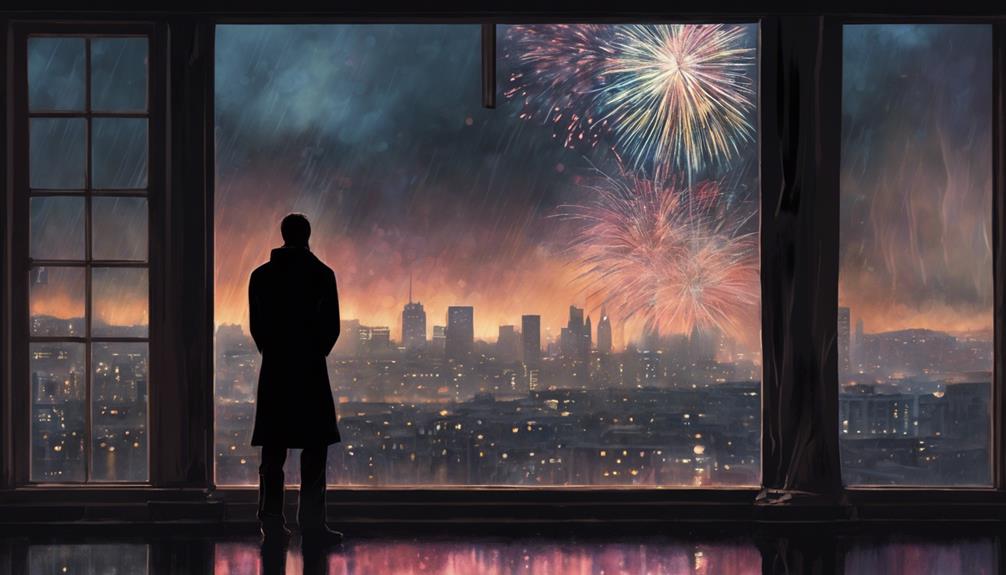
As you stand at the threshold of a new year, the city's cacophony of revelry and reflection serves as a poignant backdrop for the universal quest to understand the human experience. Amidst the fireworks and champagne toasts, you're reminded that the pursuit of meaning is a collective endeavor. The poem's narrator, lost in the rain, embodies the universal struggle to navigate life's complexities. Their introspection serves as a mirror, reflecting the human experience in all its messy, beautiful glory.
As you reflect on the past year, you're compelled to confront the inner darkness that lurks within. The narrator's rain-soaked soliloquy is a powerful reminder that even in the darkest moments, human connections can be a lifeline. The poem suggests that it's in these moments of vulnerability that we're able to form deeper, more authentic bonds with others. As you commence on this new year, you're compelled to ask yourself: what does it mean to be human? The poem's haunting beauty lies in its ability to capture the essence of our shared humanity, with all its imperfections and contradictions.
Frequently Asked Questions
What Inspired the Poet to Write About Rain on New Year's Eve?
As you ponder what inspired the poet to write about rain on New Year's Eve, consider the atmospheric melancholy that pervades the threshold of a new year. It's likely the poet sought to capture the calendric nostalgia that settles in as the old year fades, and the rain, a symbol of renewal, serves as a poignant backdrop for introspection. The poet's inspiration likely stemmed from the intersection of these two themes, evoking a somber yet hopeful tone.
Is the Poem a Reflection of the Poet's Personal Experiences?
As you explore the poet's work, you'll find that the rain-soaked New Year's Eve scene serves as a metaphor for personal turmoil. The poet's careful crafting of the atmosphere implies an introspective tone, hinting that the poem is indeed a reflection of their personal experiences. It's as if the rain mirrors the poet's inner reflection, washing away the superficial to reveal the turmoil beneath.
Can the Poem Be Interpreted as a Critique of Urbanization?
As you explore the poem, you'll find that it can indeed be seen as a critique of urbanization. The city chaos and urban alienation depicted in the poem evoke a sense of disillusionment with the fast-paced, impersonal nature of city life. You might argue that the poet is highlighting the disconnection between individuals in urban spaces, suggesting that the anonymity of city living can lead to feelings of isolation and disconnection.
Is the Rain a Metaphor for the Speaker's Emotional State?
As you explore the poem, you'll discover the rain serves as a potent metaphor for the speaker's emotional state. The melancholy atmosphere it creates hints at the speaker's inner turmoil, evoking feelings of sadness and desolation. The rain's relentless drumbeat echoes the turmoil brewing within, suggesting the speaker's emotional landscape is as turbulent as the stormy night outside.
Does the Poem Offer a Sense of Hope or Resolution?
As you explore the poem, you'll find that it indeed offers a sense of hope and resolution. The poet masterfully weaves together themes of cathartic renewal, hinting at the possibility of fresh beginnings. This nuanced exploration of the human experience leaves you with a sense of promise, implying that the darkness will eventually give way to a brighter tomorrow.
